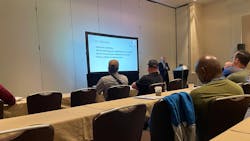Software solutions help automotive educators overcome modern teaching challenges
Preparing the next generation of automotive technicians isn't easy. Skilled2Hire's Elie Massabki, who presented “Software to Increase Teacher Efficiency and Help Students Succeed" at Tuesday’s ASE Instructor Training Conference in St. Louis, Missouri, discussed improving efficiency as a teacher and helping students succeed.
Attending educators shared their most common challenges, ranging from difficulties with student attention spans and limited resources for hands-on training to methods to increase students' success.
Through Skilled2Hire, instructors have two software suites designed to help increase their effectiveness and create additional opportunities for their students: TaskMentor and EdGame.
TaskMentor: Digital Documentation and Remote Oversight
TaskMentor lets educators manage electronic task sheets of over 500 ASE automotive repair tasks across 12 programs. Educators can inspect, comment, rate, and grade each sheet, and students can upload photos and videos of the work performed. This enables hands-on learning even when instructors can't be there and gives educators the ability to check work remotely. Both educators and students have access to the documentation, giving students a permanently accessible "cheat sheet" with all of the relevant notes, comments, and media.
TaskMentor also helps automotive students find jobs by providing lab training records that can be shared with advisors and employers. Employers can feel more confident about hiring students thanks to the video documentation attached to each task. The added documentation also helps protect educators and school reputations, and TaskMentor is Canvas/LMS compatible.
EdGame: Gamified learning to increase engagement
EdGame provides brief, daily exercises attached to leaderboards to encourage student participation. Gamifying the experience motivates students to visit and revisit the material. Instructors can assign up to 21 ASE learning modules to students, with each module having three levels of difficulty. All questions follow the ASE standards, and educators can easily track student participation to see where students are struggling. There's also the opportunity to offer extra credit or a reward for being on top of the leaderboard.
Key insights from automotive educators
Student career paths and industry retention
Attendees agreed that the majority of their students began at dealerships and franchises, with roughly 20% of students choosing not to go into the automotive industry.
Skill gaps impacting student success
Attendees said their students struggled with electrical knowledge and training, as well as soft skills, such as interviewing, interpersonal communication, customer service, and "common sense."
Industry demands and expectations
An industry survey of 100 dealerships and repair shops reported that operators want students with more hands-on training, improved work ethics, and consistent attendance, as well as more clarity on students' true abilities.
Educational challenges in modern automotive training
Some of the biggest challenges educators face revolve around the fact that hands-on training is much more difficult. The complexity of today's vehicles is key to establishing basic skills. Resource allocation and administrative issues were also listed.
About the Author
Griffin Matis
Associate Editor | PTEN & Professional Distributor
Griffin Matis is an associate editor for the Vehicle Service & Repair Group. A graduate of the University of Missouri's School of Journalism, Matis works with Professional Tool & Equipment News, Professional Distributor, and VehicleServicePros.com.
Don't miss Matis' next article. Sign up for Professional Distributor or PTEN's weekly newsletter.

